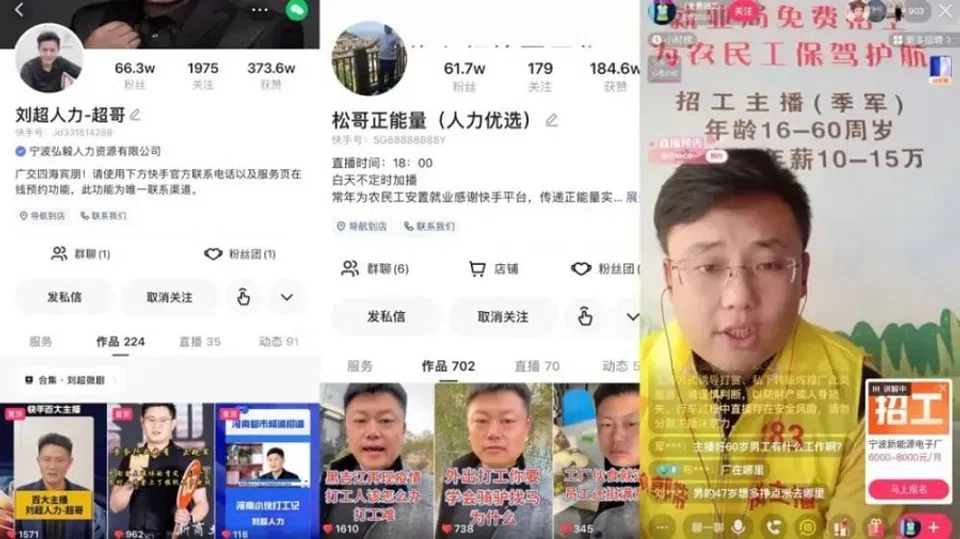China experiments with livestream recruitment to fill job vacancies after Covid-19
Chinese companies have gotten creative in their recruitment process since the Covid-19 pandemic eased. Companies can now hit a bigger pool of talent at low cost by livestreaming job vacancies, while job seekers, especially blue-collar workers, can easily send in their resumes at a click of a button. Lianhe Zaobao journalist Zeng Shi looks at how the job market is changing due to this innovative channel.

After briefly interacting with the host on a livestream channel of an e-commerce company, Xiaomin clicked on the "submit resume" button on the screen to send in her personal information to the company.
Xiaomin applied to work as a pre-sales support agent, and the host she talked to was a human resources staff of a recruitment company. The latter greeted every visitor who entered the livestream channel and gave them an overview of the e-commerce company, its job requirements and employee benefits; and even brought everyone on a virtual tour. The host also constantly urged visitors to submit their resumes, and promised to contact eligible candidates for interviews.
The e-commerce company had run the livestream on a recruitment platform to look for suitable candidates to fill job vacancies. The hour-long livestream attracted over 1,400 views.
"Livestream recruitment" is gaining popularity in China in recent years. With the diversified growth of the internet, livestreaming has permeated all aspects of Chinese life, spanning education, fitness, entertainment and matchmaking. In the past, companies recruited employees through in-person job fairs, employment websites or employment agencies, but this situation is changing.
Lowering costs and breaking down physical barriers
On various short video or livestream recruitment channels, recruitment hosts enthusiastically promote job vacancies by introducing the company through videos, photographs, or directly interacting with applicants. Job seekers could immediately ask questions, or even submit their resumes if they are decided on the job.
Compared with in-person job fairs, livestream recruitment is cheaper and is not limited by spatial or geographical boundaries. It's also convenient and time efficient, and could enhance match efficiency and save time for the talent search process.
The daily number of resume submissions [at Kuaishou's Kwai Recruitment] also peaked at over 360,000.

Since the Covid-19 pandemic, an increasing number of Chinese factories are shifting their recruitment drives onto livestream channels, with Douyin, Kuaishou and other short video platforms entering the livestream recruitment race and developing new app functions such as online resume submission.
A massive number of job seekers have since flocked to these livestream channels. Based on the data released by Kuaishou, since the platform introduced Kwai Recruitment (快招工) in January last year, its monthly active users reached 250 million in the second quarter of 2022, an increase of 90% compared with the first quarter of 2022. The daily number of resume submissions also peaked at over 360,000.
Liu Chao, a livestream recruitment host with over 780,000 followers on Kuaishou, has conducted livestream recruitment drives for over 100 enterprises and helps an average of 300 to 500 people find jobs every month.
New role of livestream recruitment host
In terms of livestream recruitment methods, some enterprises directly go on short video platforms such as Kuaishou and Douyin or recruitment platforms such as BOSS Zhipin, and have their own human resources staff host the livestream recruitment session. Other enterprises commission popular livestream channels and professional recruitment hosts to handle the hiring process. Some local governments also occasionally conduct recruitment drives on their official livestream channels.
Liu Chao, a livestream recruitment host with over 780,000 followers on Kuaishou, has conducted livestream recruitment drives for over 100 enterprises and helps an average of 300 to 500 people find jobs every month. The former e-commerce livestreamer told Zaobao that after the pandemic broke out in 2020, he helped a mask factory to urgently recruit workers. The response was overwhelming and soon after, he established his own human resources company and became a livestream recruitment host.

Liu's 20-member team includes digital marketing managers and resident hosts. Before each recruitment livestream, they would visit the partnering enterprise to understand and validate its company and recruitment details.
Liu thinks it is important to gain the trust of the job seeker. Hence, his company would also conduct follow-up activities after the hiring process is completed to keep track of remuneration and working conditions.
From blue to white collar workers
At first, enterprises mainly used livestream recruitment to hire blue-collar workers, especially labour-intensive enterprises looking for general and technical workers.
Public data show that among China's blue-collar population of over 400 million people, around 218 million and 208 million worked in the secondary and tertiary sectors respectively. The rise of livestream recruitment helps facilitate the employment of this massive labour force.
Kuaishou data also showed that over 240,000 companies had recruited employees on the short video platform in 2022, and that a total of over 5 million livestream recruitment drives had been conducted...
According to a report on China's blue-collar employment published in December 2022 by the Center for China New Employment Models, in 2022, 67.6% of China's blue-collar workers preferred to look for jobs through "interpersonal introductions", but short video platforms quickly emerged as the second choice with a share of 17.7%, a significant increase from the previous year. In contrast, direct employment with companies and labour recruitment agencies accounted for 13.5% and 9.5% respectively, both down from the previous year.

Kuaishou data also showed that over 240,000 companies had recruited employees on the short video platform in 2022, and that a total of over 5 million livestream recruitment drives had been conducted, attracting an average of 250 million blue-collar workers each month.
Following the expansion of livestream recruitment activities, high-level talents from various professions have also entered the livestreaming arena, and more positions targeted at fresh graduates and white-collar professionals are being offered.
This month, medical biotech company H-Wayen Biotechnologies held a livestream recruitment event on the BOSS Zhipin platform, recruiting for positions such as HR administrative supervisors and sales engineers, all requiring at least a university degree, and at least a master's for technical support engineers and marketing managers.
Liu said that their team is making a conscious effort to add various types of companies and positions to their live broadcasts to meet the needs of job seekers and encourage their loyal followers to upgrade themselves. He revealed that the ratio of blue-collar and white-collar job positions in their live broadcasts is now about equal.
Well-known companies such as BYD, Foxconn, Spring Airlines and Luxshare Precision have also joined in on the trend of livestream recruitment events. In June 2021, labour-heavy Foxconn announced its first online recruitment event on Kuaishou. Figures showed that the event, which was mainly aimed at people with disabilities, received nearly 300,000 views and 600 resumes for 880 open positions, with a job application rate of over 60%.

The person in charge of this pilot project told Zaobao that livestream recruitment has certain advantages, including real-time interaction between companies and job seekers through digital means and the internet, which makes communication more efficient and job-seeking safer and more convenient. However, at the same time, technology is still the priority when using livestreaming for recruitment, with high demands on hardware and software. In addition, the use of the platform also raises legal and regulatory issues related to labour laws and privacy protection, which calls for clear regulations by the authorities.
Many older job seekers are not proficient with electronic devices, yet they make up a considerable number of employees of low-wage, labour-intensive jobs such as cleaners and porters...
Older employees at a disadvantage
Professor Zhou Xiaopu of the School of Journalism and Communication at Renmin University of China told Zaobao that information asymmetry has long been a problem for the Chinese labour market, where companies cannot find suitable employees and vice versa. This new model of livestream recruitment can resolve this problem and improve employment opportunities for the new generation of workers.
However, looking for jobs through live broadcasts involves some basic tech usage skills. Many older job seekers are not proficient with electronic devices, yet they make up a considerable number of employees of low-wage, labour-intensive jobs such as cleaners and porters, and it may be difficult for them to enjoy the convenience of seeking employment through live broadcasts.
Alleviating labour shortage through livestreaming
In 2022, China's Ministry of Human Resources and Social Security issued a notice on strengthening companies' recruitment services, pushing local governments to improve recruitment agency services, and even encouraging the use of new methods of recruitment and connection, such as livestream recruitment and remote interviews to boost recruitment and employment.
Jiangsu has been dubbed the province with the largest livestream recruitment.

This year, production and daily life in China have gradually returned to normal with the relaxation of Covid-19 measures, and the labour market has quickly rebounded. Many local governments have taken livestream recruitment as an important way to promote local employment, setting up events on platforms such as Kuaishou and Douyin to ease the recruitment difficulties of local enterprises.
Local authorities in Jiangsu's Changzhou, Guangdong's Foshan and Gansu have held livestreams on short video platforms, setting up recruitment sessions for key groups such as college graduates, migrant workers and retired military personnel. Jiangsu has been dubbed the province with the largest livestream recruitment. CCTV reported that in Jiangsu's Kunshan, industry associations have even hired professionals to hold training courses for livestream hosts to boost their competitiveness.
... the hiring rate through livestream recruitment is low, as the majority of job seekers who watch the live broadcast do not meet the job requirements but apply en masse anyway.
Long-term potential unclear
However, there are also limitations to this "grassroots" recruitment model, including being considered unsuitable for attracting high-end talents. Wang Chao believes it is not easy to find suitable candidates for high-end positions through this channel, especially core talents, who are still mostly headhunted.
Efficiency in matching is also a test for companies. The human resources manager of a beauty product company in Shenzhen told Zaobao that they ran several livestream recruitments this year, mainly for positions such as livestream operations, pre-sales, and after-sales customer service. Some employees were hired, but the company generally believes that the hiring rate through livestream recruitment is low, as the majority of job seekers who watch the live broadcast do not meet the job requirements but apply en masse anyway. Hence, livestream recruitment is still being explored for its sustainable long-term growth.
This article was first published in Lianhe Zaobao as "'没报名的抓紧点击报名' 直播带岗兴起指尖下觅工作".
Related: 200 million Chinese are in flexible employment. Is this their choice? | Record 10.76 million Chinese university graduates face bleak job market and struggling economy | Why China has too many graduates and not enough skilled workers | Plight of China's new generation of young migrant workers highlights pitfalls of labour reforms | Why Chinese youths are not spending | China's youths are feeling the pressure from low wages | Solving China's soaring youth unemployment





![[Photos] Fact versus fiction: The portrayal of WWII anti-Japanese martyrs in Taiwan](https://cassette.sphdigital.com.sg/image/thinkchina/3494f8bd481870f7c65b881fd21a3fd733f573f23232376e39c532a2c7593cbc)